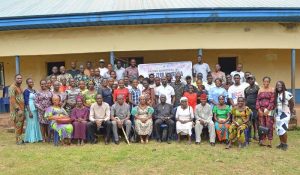On Saturday, July 15, 2023, the Nkporogwu community in Ukehe town of Igbo Etiti Local Government Area in Enugu State hosted the South-East Community Consultation on Emission Reduction to Mitigate Climate Change. The activity was part of the project initiative to Raise Awareness on Net-Zero Emission in Nigeria (RANTZ Nigeria Project).

Like several other countries, Nigeria had set its sights on developing low-emission strategies to combat climate change. Recognising the importance of this endeavour, various stakeholders, including civil society organisations (CSOs) and communities, have come together to offer their support.
Three CSO platforms are leading the charge in raising awareness about the urgent need to reduce net-zero carbon emissions in Nigeria and they include the Centre for 21st Century Issues (C21st Issues), International Climate Change Development Initiative (ICCDI Africa), and Connected Advocacy (CA).
Olumide Idowu, the Executive Director of ICCDI Africa, in an opening address, spoke about the dire consequences of climate change and proposed several strategies to minimise its detrimental effects. Representing the other project consortium members, the C21st Issues and CA, he emphasised their common concern for the environment.
Idowu stressed the significance of community engagement in taking proactive measures to achieve net zero and outlined the goals of the programme.
Igwe Mick Odo, the Chief of the community and representative of the Ukehe LGA, echoed the urgency of combating climate change. He pointed out that it was not just an issue impacting the wealthy or impoverished but a global concern affecting nations of all sizes.
Among the pressing issues discussed were gas emissions, forest preservation, and environmental conservation. Participants raised thought-provoking questions, seeking solutions to these challenges.
They pondered alternatives to burning firewood and gas, and how citizens could curtail gas emissions. The management of forests, including deforestation and afforestation practices, was also a topic of concern. Additionally, the combustion of gases from vehicles and heavy-duty machines was addressed.
Another grave consequence of environmental degradation highlighted during the event was the loss of many animal species due to excessive hunting. In response, the Enugu State Ministry of Environment, through the Department of Climate Change and Environmental Management, mandated Forest Guards to patrol the forests and safeguard against deforestation. A standing order required individuals to plant 10 trees before cutting down a single one, with permission from the Ministry. Moreover, there was a pressing need for a policy to combat bush burning.
The discussion also delved into achieving a balance in society, encompassing both climate and environmental equilibrium. Participants recognised that no government could solve their problems without their active involvement. Many people were unaware of the consequences of cutting down trees for firewood, which contributed to gas emissions.
One solution proposed was cooking with gas cylinders instead of firewood. However, concerns were raised about the affordability of gas cylinders for all, as well as the belief that food prepared with firewood had a unique taste. Supporters of cooking gas highlighted its advantages, such as faster cooking, cleaner kitchens and utensils, and the ability to multitask while cooking. They also emphasised the reduced emission of harmful gases.
On the other hand, some parties raised concerns about the risk of gas explosions and the limitations of gas for certain cooking practices, like palm oil processing.
“Nevertheless, it had been proven that using gas reduced health challenges associated with burning firewood,” participants observed.
The community members recognised that demanding affordable cooking gas from the government was crucial. They acknowledged that while they couldn’t change the government itself, they could change their attitudes and presumptions.
In 2018, through the Enugu State Ministry of Environment and the Department of Climate Change, the Enugu State Government distributed gas cylinders and National Clean Care Stoves to the 17 Local Governments, exemplifying the government’s commitment to sustainable practices.
The event concluded with a message: If the communities don’t act and communicate their needs and desires to the government, change will not happen. Change is essential to focus on achieving net-zero emissions as a collective effort.
“The community consultation event achieved the aim of the RANTZ Nigeria Project and has left a lasting impact on the communities of Igbo Etiti LGA. The seed of change has been sown and, with their newfound knowledge and determination, they are ready to embark on a journey towards a more sustainable and environmentally friendly future,” said Idowu.
By Rukayat Odebiyi and Olumide Idowu, ICCDI
